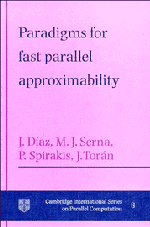Book contents
- Frontmatter
- Contents
- Preface
- 1 Introduction
- 2 Basic Concepts
- 3 Extremal Graph Properties
- 4 Rounding, Interval Partitioning and Separation
- 5 Primal-Dual Method
- 6 Graph Decomposition
- 7 Further Parallel Approximations
- 8 Non-Approximability
- 9 Syntactically Defined Classes
- Appendix 1 Definition of Problems
- Bibliography
- Author index
- Subject index
8 - Non-Approximability
Published online by Cambridge University Press: 19 March 2010
- Frontmatter
- Contents
- Preface
- 1 Introduction
- 2 Basic Concepts
- 3 Extremal Graph Properties
- 4 Rounding, Interval Partitioning and Separation
- 5 Primal-Dual Method
- 6 Graph Decomposition
- 7 Further Parallel Approximations
- 8 Non-Approximability
- 9 Syntactically Defined Classes
- Appendix 1 Definition of Problems
- Bibliography
- Author index
- Subject index
Summary
In this chapter we consider some problems that are non-approximable by NC algorithms unless P=NC. The basic technique used to prove non-approximability is the design of a reduction that generates instances in such a way that a gap in the value of the objective function is created.
First we concentrate on the Induced Subgraph of High Weight type problems studied in Chapter 3. Anderson and Mayr [AM86] studied this problem when the weight considered is the minimum degree of the graph. They provide a reduction from the Circuit Value problem to the High Degree Subgraph problem that creates a 1/2 gap in the weight of the so obtained instance. Kirousis, Serna and Spirakis studied this problem for two new weight functions, namely, vertex connectivity and edge connectivity, (see [SS89], [Ser90], [KSS93]). Kirousis and Thilikos analyzed the graph linkage [KT96] whose approximability presents the same kind of threshold behavior. All non-approximability results follow the same technique, that is, they create a graph, translating each circuit component or connection into a particular subgraph, in order to generate a graph that satisfies the required gap properties.
Our second result corresponds to problems that are non-approximable in NC, which means that for any e we are able to generate an instance in which an e-gap appears. Serna [Ser91] showed that the linear programming problem cannot be approximated in NC for any ratio, other non-approximable problems can be found in [SS89], [KS88], [Ser90].
To complement the non-approximability view we want to consider also the possible paralellization of heuristics used to deal with NP-hard problems.
- Type
- Chapter
- Information
- Paradigms for Fast Parallel Approximability , pp. 108 - 127Publisher: Cambridge University PressPrint publication year: 1997



